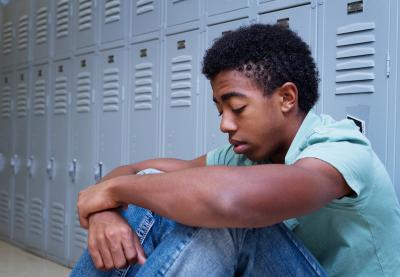Editor's note: We know we are not seeing every incident of hate and bias in U.S. schools, as many students with marginalized identities see their bullying or harassment go unreported or unrepresented. So we're asking for your help. If you know of an incident occurring in your school, please email hateinschools@splcenter.org.
As the year wound down in U.S. schools, instances of hate didn’t let up. In May, news outlets reported 72 incidents, nearly double what we saw in April.
This is the second-highest total we’ve seen since we began tracking hate in schools last October.
Here’s what we noticed in May:
- Incidents occurred in Washington, D.C. and in 25 states, from Oregon to Maryland.
- The most incidents were reported in Pennsylvania. Four of the nine reported there occurred within one school district.
- The majority of incidents took place at high schools.
- Most of the incidents involved racial antagonism or slurs.
- Five incidents targeted Muslims, and two were rooted in anti-immigrant hate.
- At least eight incidents were sparked by social media posts.
- There were 12 cases of graffiti or vandalism that contained racist, anti-Semitic or anti-LGBT slurs.
- At least nine incidents were perpetrated by adults.
- Twelve reports involved harassment; one involved cyberbullying.
- At least 11 were anti-LGBT incidents.
Many of these experiences were severe, including at least 13 direct threats to students’ safety.
In Sedro-Woolley, Washington, a middle school student was called the n-word by another student, then stabbed in the arm six times with a pen. Friends of the attacker later joined in with racist taunts.
In North Bend, Oregon, a student was reportedly forced to read the Bible as punishment for their sexual orientation. In another school, two gay students were called homophobic slurs and physically attacked. One of those students said a school resource officer told her she was going to hell and that she “should be prepared for things like this.”
During lunch at a Katy, Texas, junior high school, every black eighth-grader received threatening text messages from unknown numbers that included the n-word and the phrase “y’all can die.” Sent just four days after the nearby Santa Fe, Texas, shooting, the text messages left many students “scared to death,” a parent said.
In Rockville, Maryland, a 16-year-old Muslim student who wears a hijab and ran to represent students on the county school board received threatening emails through her campaign website: “Choke on ur hijab terrorist [expletive],” “Why do you even breathe” and “Get the [expletive] out of my country,” to name just a few. After losing the election, she received a message saying she should be grateful. The writer said they would have otherwise “shot up” all the schools in the district.
In Glenelg, Maryland, four graduating seniors spray painted swastikas and homophobic and racist slurs and graffiti across the campus. Some of the graffiti was directed at the school’s African-American principal, calling him the n-word.
Some of the reports indicate systemic issues. In Haverford, Pennsylvania, school officials heard from community members during a board meeting who detailed racist and Islamophobic incidents that took place inside or near schools. For example, classmates of a Muslim student called him the n-word, “terrorist” and “Osama bin Laden” from middle school through his senior year in high school. A substitute teacher announced to the class that he would call an African-born student “cave man” because he thought his name sounded similar to that of a hominoid recently discovered in South Africa.
This incident wasn’t the only in which teachers or other school personnel perpetuated the hate that educators are supposed to protect their students from.
In Fayetteville, North Carolina, a teacher called a black student the n-word in class. In Cleveland, Ohio, a public-school bus driver went on a profanity-laced tirade that included racial and homophobic slurs directed toward an 11-year-old child. In Annapolis, Maryland, a third-grader told his parents a bus driver called him a racial slur. In Leavenworth, Kansas, a substitute teacher told a student, “Don’t give me your ugly black girl face.”
And in Houston, an elementary principal was talking to three staff members about a black special-needs student who often runs from class. The next time he runs away, she said, “We won’t chase him. We will call the police and tell them he has a gun so they can come faster.”
The majority of schools were quick to respond to these incidents by condemning the acts and the hatred behind them, investigating or publicly apologizing, and encouraging a broader conversation about diversity. However, a few were slow to respond. Two schools provided no public comment on the events; one school denied that the hate incident took place.
At two other schools, students who committed hateful acts were not held accountable for their actions. In Butler County, Pennsylvania, for example, a white student called a biracial student the n-word, which led to a fight. The student who was called the n-word was suspended, but the instigating student did not face any disciplinary action.
In past months, we’ve recognized that the hate incidents we’ve tallied were most likely under-reported. The jump in the number of reported occurrences in May could offer a clearer reflection of the state of our schools, but it also almost certainly represents only the tip of the iceberg. Even so, the dramatic increase reminds us that we must be vigilant in our efforts to root out hate in spaces that harm the most vulnerable among us.
As summer begins and teachers, support staff and administrators look ahead to a new school year, we encourage educators to prepare and implement strategies for tackling hateful behavior head-on, and for holding accountable those who exhibit it.
Dillard is a staff writer for Learning for Justice. To report a hate incident happening at your school or community, email hateinschools@splcenter.org.
